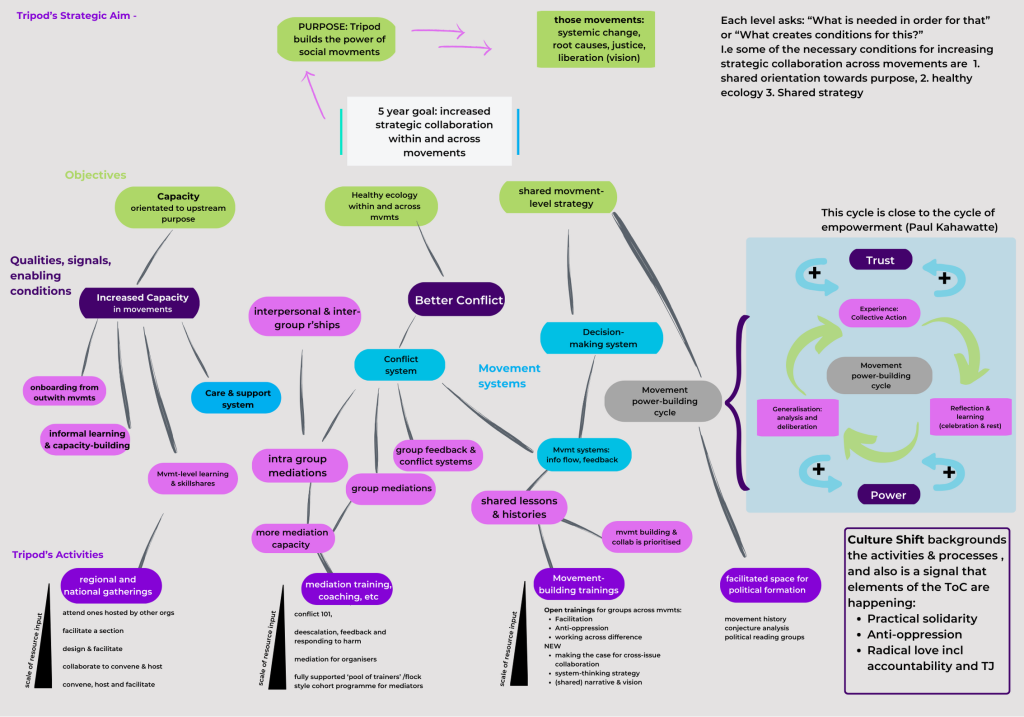“An organisation is a specific and strange thing, like a Flintstones vehicle – it moves based on the aligned energy of those powering it from within. So know where you’re heading.”
adrienne maree brown
At Tripod HQ, we’ve been busy working on our new 5-year strategy: imagining what we want to do as a collective, and how we will get there. The short version is: we’re focusing on building relationships and increasing capacity for strategic collaboration within and across movements, in Scotland and beyond. We’re excited to share this, and invite you to collaborate with us on bringing to life our vision of vibrant, diverse and intersectional movements for justice! This blog post shares some of our observations, analysis and process of arriving at a current best-guess of where to go from here.
How we got here
We’ve been in many strategy processes in our time, some more effective than others, and some that never got to materialise, so we know strategic thinking comes with many challenging questions. How to balance limitations of capacity with the scale of change that is really needed, how to realistically look at the crises we face without becoming overwhelmed and frozen, how to have clarity of purpose and also keep flexibility to adapt to changing contexts. To even begin thinking about strategy can be a daunting prospect for many of us and requires pausing long enough in the work that is urgently needed to be able to zoom out and reflect.
It feels both essential and impossible to have an organisational plan in this moment, and we’re hoping that by sharing the piece of the picture that we think is our work to do, we can encourage a wider exchange and dialogue, to ultimately collaborate better and coordinate the many roles and elements of what is needed just now. As a collective of facilitators and trainers, we work with many different groups and movements in Scotland, across the UK and beyond, and have a perspective that doesn’t often get shared directly. We’re sometimes so focused on holding space for others that we don’t give our own analysis of the movements we serve and their political context. Over the last year and a half, alongside running our programmes, a lot of our energy has gone into processes within our team: a harmful and explosive staff review process and a conflict that resulted from some bad decision-making; a wholesale re-evaluation of our organisational ‘DNA’, ways of working and internal systems; and finally, a forward-looking strategy process this Autumn to come up with a medium-term plan of where to put Tripod’s focus. Now we’ve emerged from under a pile of flipcharts and sticknotes having reached some decisions about our direction, we’re putting it out in the world!
The strategy
Our goal in the coming years is to help create the conditions for effective cross-issue collaboration, in Scotland and beyond. This means supporting the shift we are already seeing away from campaigns on single-issue topics, towards increased emphasis on shared root causes, which we believe has the potential to create more compelling and effective strategies for our movements. This isn’t a brilliant new creation we can take credit for, though, there are many examples of more joined-up organising across the traditional boundaries, which we want to see grow and connect into mass social movements with transformative power. We see this potential when climate and queer liberation organisers team up to win on pinkwashing by oil companies, the current campaign by tenants union Living Rent to prevent migrants becoming homeless due to mass evictions by Mears and the Home Office and the alliance of workers, copwatchers and anti-raids groups to support and defend delivery riders. These are the building blocks of a larger structure of strategically coherent campaigning which connects the various symptoms of state and corporate violence and moves us towards a vision of liberation and justice.
“Strategy without tactics is the slowest route to victory. Tactics without strategy is the noise before defeat.”
Sun Tzu
A theory of change sets out the logical connection between the strategic aim and the activities (or tactics) we plan to use to achieve that aim, and why doing those activities will bring about the aim. The theory of change of Tripod’s strategy is summarised in the flow diagram below, where we have articulated some of the things that are needed to support effective cross-issue collaboration, and where Tripod’s skills and other resources could fill some of those gaps. Like any theory of change, this is a working best-guess, and will remain live as we review and evolve our work over the coming years.
Tripod’s Strategic Aim: By 2030 Scotland has a vibrant, diverse & intersectional social justice movement that has a shared strategic vision & increased collaboration

Conflict
One key element we think is missing in movements is the capacity to navigate differences, disagreement and conflict. In recent months, a big proportion of requests for Tripod’s support have been internal conflict, and conflict between groups who are connected through their work. We hear how grassroots campaigns, co-operatives and other groups are held back by conflict: interpersonal tensions, disagreement about power & decision-making or disagreements about how to respond to harm. Many of these conflicts centre around differences of experience, replication of oppression within groups and movements: particularly racism and transphobia. We also see the wider context in which conflict emerges: a dominant culture in which feedback is reactionary and comes with threats of punishment, rather than from a place of problem-solving and mutual support. The ability to learn from feedback, grow to integrate the needs of all group members and transform painful experiences into better ways of working is essential for any group to work towards its purpose.Better skills and support with conflict could unlock the potential for moments of tension to catalyse transformation and learning, rather than exhaustion, animosity and division. For these reasons, we see doing conflict differently as a key leverage point. Joining Navigate, who are running a series of trainings to scale up the numbers and skills of people doing mediation and conflict work in their 2024 plans, we will make conflict a central focus of our work in the coming years. This comes in a context where legislation and policing in the UK becomes increasing hostile, the inquiry into the death of Sheku Bayoh in the custody of Police Scotland, the implementation of new powers to repress and oppress and ongoing failures of the so-called justice system. Another generation is questioning role of state violence and connecting the functions of political policing and the further criminalise migrants with moves to target working class organising too. It is vital to connect the aims of our movements for justice, including the abolition of the criminal legal system, with our work to build skills & capacities to transform conflict and harm within our communities.
Movement-building training
We will continue to deliver training on essential organising skills, such as facilitation, anti-oppression and collaboration, while developing more of a focus on movement-building and inviting participants from across various struggles to join us in sharing our lessons. This is a shift from focusing our efforts on particular support for the climate and migrant justice movements, to working with these and other movements in a more joined-up way which reflects both Tripod’s commitment to intersectionality and the strategic view that many of our connections in those movements would benefit from working more closely together.
Discernment and data
Tripod has ongoing relationships with groups in the Scottish and UK movements, which inform our sense of what is needed, and the staff and Board members who contributed to this strategy are active in fights for climate, migrant and disability justice, queer liberation and other solidarity organising. We looked at many incoming requests for support and some of the underlying causes for the challenges facing organisers in the recent past as well as using movement lifecycle and relationship mapping tools to get a basis for asking ourselves a series of questions about what we can predict in the coming years.
In our strategy process, we also considered what have been the most impactful things that Tripod has contributed to movements in the past, what are we good at and what gives us energy. The answers to these questions covered many things, but at the core of our work is the creation of transformative experiences: trainings that illuminates unrecognised skills or capabilities, conversations that see challenges not as individual failings, but as shared potential, or the magic of bringing people together and taking collective action for their lives and for our shared world.
There are many aspects to making change, and many things are needed to bring about the required change, most of which we have decided don’t belong to Tripod at this time. We think carefully about our role in the ‘moment ecology’. As a movement-support organisation, we don’t do the work of campaigning or creating the alternative models needed. We also know the vital need for other pieces of movement infrastructure: the skills and resources that groups and individuals need to be able to do movement work. This includes free and accessible physical spaces to meet and gather, communication and other non-corporate tech that supports our work, legal know-how and pots, pans and chefs to fuel movement activities – fortunately, we’re well connected to folk working hard on all of those things.
There are elements, even within this strategy that we have chosen for now to not make a central focus: national and local movement gatherings are not our main priority to instigate, because we know of others doing that work, which we can contribute to. To grow the capacity required to make lasting change, we also need, as Margaret Killjoy writes “people to invite people in [to our movements] and help them find where they feel best and can be the most useful.” The work of bringing in those who aren’t already involved, is essential in building a connected and powerful force for change and breaking down the divide with those who call themselves ‘activists’ and everyday resistance to capitalism and its crises. Each of these areas are really needed, and we believe that there are others who are better suited to filling those gaps than Tripod, and we’re looking forward to working alongside them/you.
Next steps
At the moment, we are sharing this strategic direction, gathering feedback and getting clear on what we need to make it happen. The next phases will include sourcing funding, building more partnerships and recruiting additional staff to make sure we have the resources and skills needed.
Our work in 2024 will bridge towards our new strategy: in the first half of the year, we’re hosting a series of relationship-building events to connect the migrant justice movement to many other spheres of organising, we will also begin to expand our work on conflict skills – in partnership with our pals at Resist+Renew.
Join us
“We never know how our small activities will affect others through the invisible fabric of our connectedness. In this exquisitely connected world, it’s never a question of ‘critical mass’. It’s always about critical connections.”
Grace Lee Boggs
We want to hear from you if your strategy connects to ours in some way: because you’re doing work that supports collaboration across groups and movements in similar or different ways, because you are filling the other gaps we’ve identified but not prioritised in this period, or because you’re interested in discussing more what we imagine this looking like in practice. Powerful movements require us to share what we’re doing and why, to shore up one another’s work rather than compete for space.
Our support
The Tripod staff team has had enormous support throughout the last 18 months, and there are many people we thank for this:
- Our advisory board, who gave many voluntary hours to individual conversations, facilitating tricky meetings and feeding back to keep our ambitions in line with the hours we have in a day.
- Facilitators: Sarah Lopez supported us to reconnect in the painful aftermath of conflict, Kathryn Tulip helped us re-lay the groundwork of organisational DNA, and Tam Omond worked with us on developing the programme-level strategy.
- Our many colleagues, collaborators and accomplices have shared many conversations, dreams for projects yet to see the full light of day and moments of brilliance that have shaped our thinking on strategy, facilitation and our role as a collective. Particularly working alongside Navigate over the past few years has sharpened our analysis of movement-building, strategy and conflict – thank you!
- Many groups and organisations who have trusted us as facilitators of their strategy processes and other work which gives insight into the movements we are part of, and practical knowledge of the needs, strengths and potential for transformative social change.

